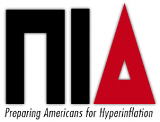
Three months ago, the FOMC approved the establishment of the Primary Dealer Credit Facility (PDCF). This action was taken pursuant to Section 13(3) of the Federal Reserve Act, which empowers the Board of Governors of the Federal Reserve to authorize a Federal Reserve Bank to lend to a corporation, including a securities firm, in “unusual and exigent” circumstances when the corporation cannot “secure adequate credit accommodations from other banking institutions.”
At that time, the Board of Governors made the “necessary” statutory finding that market circumstances were indeed “unusual and exigent”. Truthfully, this is a mild extension of the truth. The Federal Reserve had been watching market rumblings and before the month of March to begin to put “the necessary statutory” legalities into place. Otherwise, the Federal Reserve could not have created the PDCF.
The Federal Reserve decided that without increased access to Federal Reserve liquidity by major securities firms on Wall Street, overall financial market conditions would have deteriorated further and would have had a substantially adverse effect on the economy or at least investors and investor confidence in the economy.
Effectively, a new floor was installed in the U.S. banking system hinging on the burgeoning national debt of the United States, which U.S. taxpayers and citizens are declared as legal owners.
What has happened upon the collapse of Bear Stearns? The Fed made use of existing business relationships with a group of 20 securities firms, known in Fed vernacular as “primary dealers.” These primary dealers are large national and international financial holding companies where the Fed has a strong supervisory appearance. The Fed works with the SEC to supervise smaller financial companies.
To support Fed monitoring efforts closely coordinated with the SEC, the Fed receives mandatory internal information from the financial holding companies on a daily basis that enables them “to identify changes in the level and composition of the firms’ holdings of cash and unencumbered, highly liquid assets.” The banking world has now been effectively “nationalized”. The Fed also listens to the market scuttlebutt behind the scenes and from these firms to determine the mood and outlook of investors and others in the banking community.
The Fed continues to insist that these primary dealers are strengthening and are happy to have learned valuable lessons in risk management. The Fed is learning how to operate the PDCF to balance the financial system and admits to looking at other options in the future.
The Fed has decided that they will do nothing to stem the burgeoning complexity and creativity of the financial marketplace. As institutions and regulations grow larger and more complex, the Fed is guaranteed an important role in the supervision, control, management and exploitation of the financial system. What does this mean?
Clearly, despite the likes of Ron Paul and “libertarian-leaning economist-writers”, the Federal Reserve will continue to prosper off the backs of the American taxpayers while prospering investors and banking types across the planet, further cementing slavery of the masses across the globe. The Federal Reserve is a privately-held corporation connected to a consortium of global bankers that perform the same tasks the world over. The Federal Reserve’s umbrella supervision role closely complements other central bank responsibilities that have been assigned to them such as fostering financial stability as well as deterring or managing financial crises. The International Society of Bankers has no plan to take a back seat in running the world for their profit and gain or the gain of those in powerful places that support them. The global control of a new banking empire is virtually complete.













I must say this is a great article i enjoyed reading it keep the good work :)
Comment by Sue Massey — June 23, 2008 @ 6:01 pm